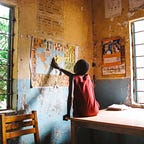The Selection Process
I am sitting here tonight in the MBB Haiti office in Gros Morne, having just returned from a visit to Grand Goâve, the town that I moved to when I first came to Haiti almost 5 years ago. and where I worked as the Director of a Children’s Home. Today is a national holiday in Haiti, and so our offices were closed. I took advantage of the day off to visit some of the children and staff with whom I worked so closely with.
Having been the person responsible for the enrollment of most of the children at the children’s home, and for having hired and trained much of the staff, going back always is like going home in a sense. This time in particular, a few volunteers from the States with whom I’ve become friends with over the years were visiting, too, and so there really were “all the feels” as I sat at the dinner table last night and shared some stories of my work there…
I told the stories of how difficult it was to look a woman in the eye and question her honesty when she tells you that this child before her is orphaned and in desperate need of your help. I told her how hard it is to know that even though people may in fact need help, the overwhelming amount of need can render many valid arguments irrelevant, and that the presence of a living parent, whether that parent can provide anything at all for the child or not, did in fact serve to disqualify potential enrollees.
On the heels of administering an evaluation exam to the some 120 girls who were submitted to Mercy Beyond Borders in consideration for some 30 vacant spots for our next incoming cohort, I couldn’t help but feel some of those same frustrating and often discouraging feelings.
Having 90 girls come to a local school on Saturday this past weekend, knowing full well that the results on this exam would weigh heavily on the deciding factors I am tasked with considering, was a lot to carry — not only for the girls, but for me as the Country Director, too. Having to turn away girls who showed up late, even though in Haiti being on time is sort of a suggestion more than a requisite, does not make me feel good inside. Having to dismiss girls from the exam for talking to one another during it, even if perhaps that isn’t something egregious in local schools, was not fun. Telling parents that their children didn’t qualify even though they earned the necessary grade point average for their 6th grade year was not fun, either. All of it, however, is necessary.
I’ve gazed over the exam results for a few hours now, running data models this way and that way. Looking at the grade point average for the year vs. the score earned on the exam for egregious discrepancies. Weeding out potentially erroneous reporting from the schools and the teachers all while considering factors such as the school of origin and the relative historical performance of those schools against the earned grade point average; using that as a “curve” of sorts.
All the while knowing that the decisions I am making will have long-term effects for 60 or so girls, and by extension, for 60 or so families, too.
I feel good about my decision making process, though. Using variance as the first data point to serve as a way to narrow the list of potential girls who qualify is the best way I know how to vet potential misreporting or erroneous scoring. Then narrowing down by general average (GPA) for the 6th grade year as another perspective. Looking at the actual exam score and weeding out those who, while they may not test well, need to test well in any school in Haiti to get past the 9th grade. Finally looking at the school from which the girls completed their primary education, and weighing the relative strengths and limitations of those schools.
I now have a healthy list of 35 girls from 13 different schools, and I feel good about that. While we never want to deny a girl the opportunity and the great gift and blessing that these scholarships provide them and their families, the truth is, our mission is to make ways for girls and women to develop in to excellence and leadership roles. While we know that not every strong academic is a natural leader, and that not every leader may be strong academically, we do need to set a bar here, and we need to set the bar high. We need a rigorous scholarship program demanding the best of the girls who enroll, and we have an obligation to set these girls up for success in this program.
Tomorrow, the parents of these 90 girls will come to my door, anxiously looking for their daughter’s name on the list of accepted students. I will likely have to explain how sorry I am that your daughter wasn’t chosen. I will have parents crying, girls crying, and disappointed faces in and out of my office all day. But I will also have 35 ecstatic young ladies — smiles, proud parents, and the feeling that I did what I felt best for this potential cohort, and did it as thoroughly and as fairly as possible.
After all, you can’t boil the ocean. Do what you can, and do it well.
Thanks for listening.
-JHL.
